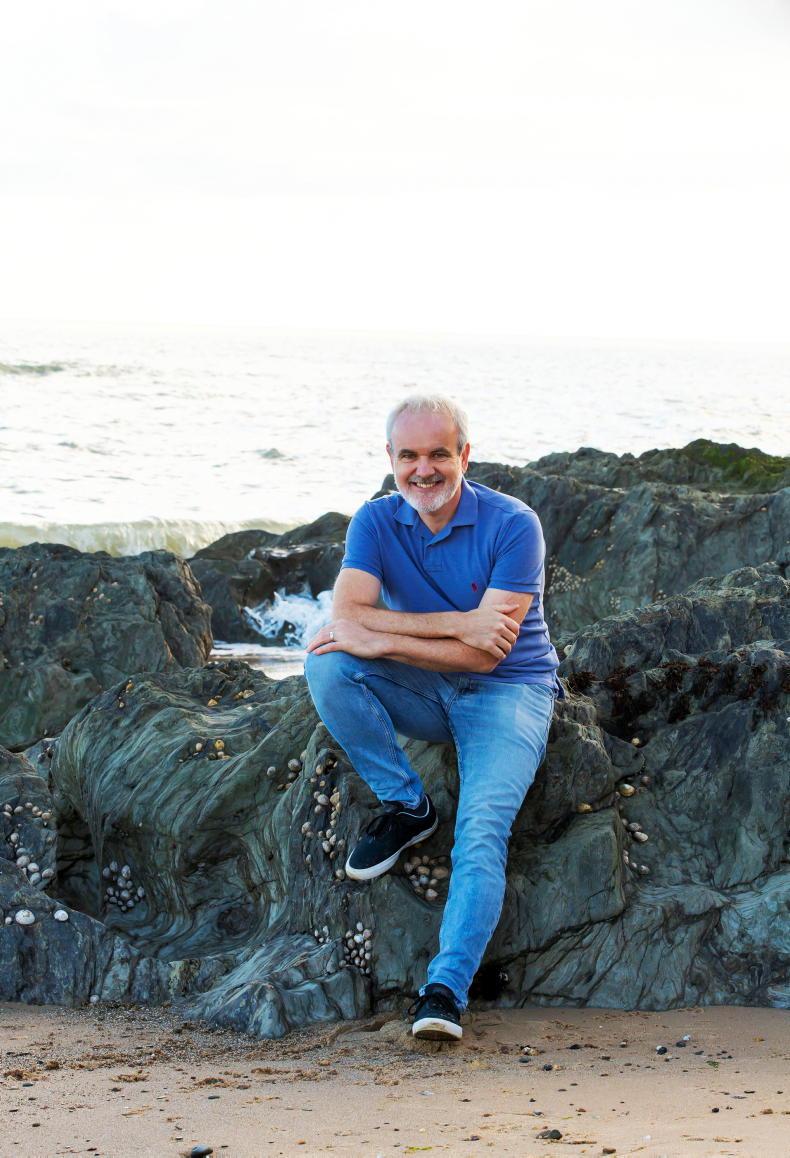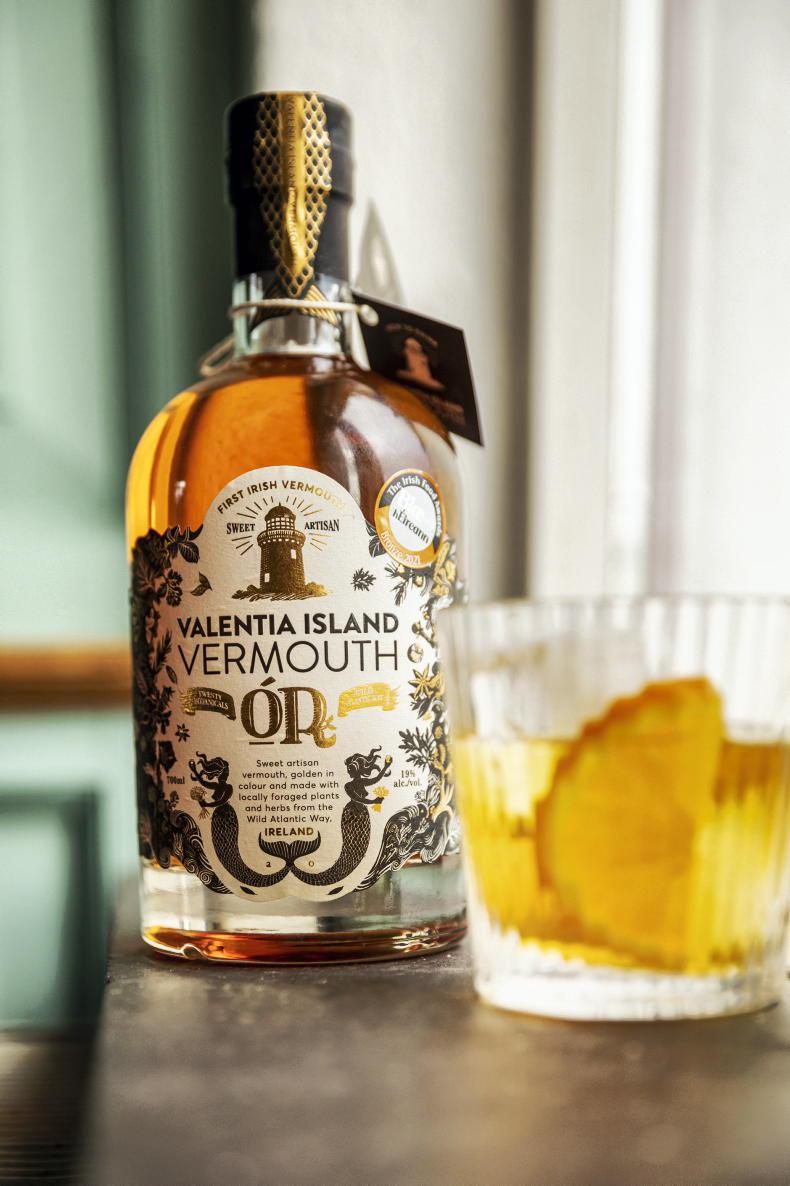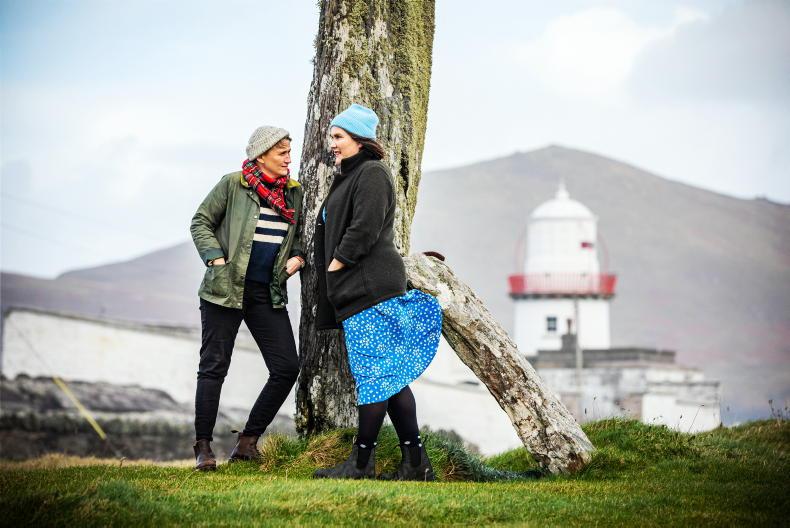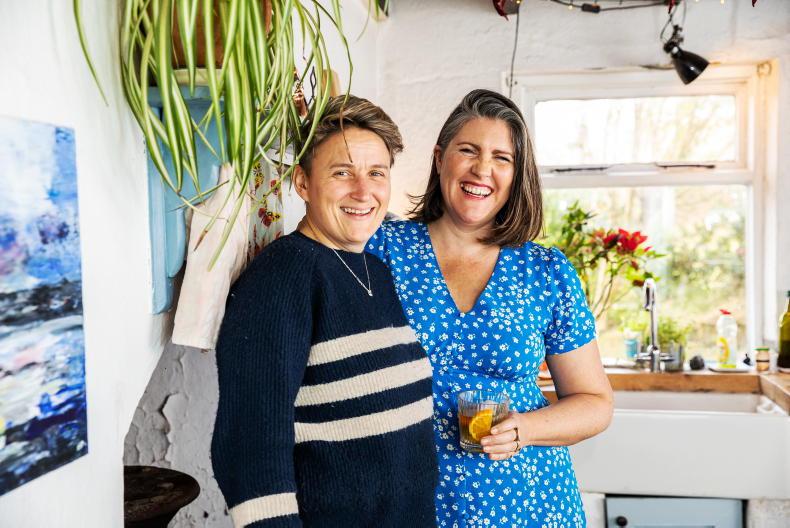The month of June is now ubiquitously entwined with Pride celebrations. You will find that iconically colourful rainbow flag in shops, around local Irish villages and displayed on branded logos in an annual show of solidarity with the Irish LGBTQ+ community.
Earlier this month, there were discussions around whether the straight community has the right to promote Pride within their businesses and publications – especially if they aren’t directly working to benefit the LGBTQ+ community.
These are good discussions to have, and good questions to ask at a time when corporations can easily benefit from slapping a Pride flag onto promotional materials. But while some businesses might take advantage, it is still important for Irish communities to celebrate Pride – this includes the close-knit, but small and largely rural, Irish food community of writers, producers, creatives and chefs.
Colm O’Gorman
Colm O’Gorman is a member of the Irish food writing community. Until recently, he penned a popular cookery column in The Irish Examiner, and he continues to share recipes and tips on his social media streams. However, he is probably best known as the former executive director of Amnesty International Ireland. He
also founded One in Four, an organisation which supports survivors of child sexual abuse.
A published author and celebrated humanitarian, Colm lives in rural Co Wexford with his husband, Paul, and the couple have two adult children. During the Marriage Equality referendum in 2015, Colm was on the front lines of the campaign. He says that, on many levels, things have changed for the better for the Irish LGBTQ+ community.
“I can introduce Paul as my husband and it’s just not a thing anymore,” he explains. “Thirty years back, even when I was living in London, you always used gender-neutral pronouns to describe your partner. Now, while our lives and relationships are more open and normalised, we’re also actually able to be more private – we’re not the subject of curiosity anymore. There’s huge peace in that.”
Along with this, though, comes a dark undercurrent as certain cohorts of the population seek to alter the positive narratives around the LGBTQ+ community.

Colm O'Gorman is a food writer, recipe developer and former executive director of Amnesty International Ireland. He lives in rural Co Wexford with his husband, Paul.
“You can’t say everything is rosy,” Colm says. “The online sphere is horribly toxic now, and that has an impact on the lives of the LGBT community, and particularly on young people. Pride was always about protest and resistance. It came from a refusal to conform or be invisible. I think there are still many who don’t understand that.”
Colm believes that celebrating Pride month each year is now more important than ever before, both for the LGBTQ+ community and their straight allies, because ultimately it’s about celebrating our belief in a strong, vibrant and modern society.
“The year before the referendum, the polls were saying 72% of the population would vote yes,” Colm recalls. “But I remember thinking – how can we get the general population to understand that they have a stake in this, too? This referendum mattered beyond the issue: we were being asked as a society – for the first time – if we believe the loving, intimate relationships we form as the foundations on which build our families, societies and our republic are worth equal protection. It was much more existential than the issue at hand.
“That is why, when the results of the referendum were announced, we saw tens of thousands of people coming out onto the streets to celebrate,” he adds. “We had manifested who we wanted to be, as a society.”
Valentia Island Vermouth
Kerry-based Anna and Orla Snook-O’Carroll were not living in Ireland at the time of the referendum, but say they are eternally grateful to those who spent so much time and effort campaigning and working to bring marriage equality to Ireland.
“Anna and I always say that there isn’t a hope that we would have moved back here as a married couple if it wasn’t for the marriage equality bill,” Orla tells Irish Country Living. “Presumably, we wouldn’t have gotten married here either – I mean, none of this would have happened.”

Anna and Orla's product, Valentia Island Vermouth, has won numerous awards since its launch in 2021. \ Philip Doyle
The duo moved to Ireland in 2018, where they had purchased their Valentia Island cottage the year prior. In 2021, they launched Valentia Island Vermouth.
From its inception, the drink has been well-received by Irish stockists, bartenders, mixologists, food and drink critics and the general public.
This is because it’s not your average vermouth – far removed from the dusty bottle sitting in the back of your parent’s liquor cabinet.
This vermouth is delicate; with a caramel essence and herbaceous notes that tell of the island landscape surrounding the couple’s windswept cottage. The pair developed the recipe, which includes 20 different foraged botanicals, after moving to Valentia Island permanently from Bristol in the UK.
Orla is originally from Wicklow, and would regularly go on holidays to Kerry with her family. She and Anna met and fell in love while attending art college and, for many years, the pair lived and worked in Bristol before purchasing their home on Valentia Island. They say that if the referendum had never happened, they might have felt differently about moving to rural Ireland when they did.
“We’re married seven years this summer,” Orla says. “We got married at the lighthouse in Valentia and it was just the most beautiful, magical day. My sister is a celebrant, so she married us. For our ceremony, she had mapped out what all the stars were doing and mapped that to where we were in our life and it was incredible the way she brought our whole universe to the lighthouse.”

Before moving permanently to Valentia Island, Orla and Anna were married at the Valentia Island lighthouse in an intimate ceremony. \ Philip Doyle
Anna and Orla say the Marriage Equality Act made them feel they would be welcome and could thrive on the island; despite moving away from a supportive LGBTQ+ community and their beloved arts scene in Bristol.
“[Before we moved], we had a business that combined immersive theatre with fine dining events and we absolutely loved it, but it wasn’t working out financially,” Orla explains. “When we were getting married here, our friends and family were asking, ‘would you move here?’ and we didn’t think that was possible until we were older. But by the following November, we had moved here permanently.
“The people here are very supportive, and I think it’s so handy [since the Marriage Equality Act] that even though we moved somewhere where there isn’t as much of an LGBTQ+ community, through the Yes Campaign, the words ‘queer’ or ‘gay’ had already made their way into people’s kitchens [where before they were mostly used in the LGBTQ+ community].”
In the lead-up to the referendum, Orla says the Yes Campaign did a great job of filtering the idea of marriage equality into every part of Irish society.
“They did a really cool thing [in particular],” she recalls. “They asked LGBTQ+ youth to ring their grannies and grandads and come out to them. And their grandparents were really supportive. It brought it back to the person. It showed we’re actually just completely normal people who drink tea!”
For UK-born Anna, moving to rural Ireland was more of a move into the unknown; particularly as she had made the city of Bristol home for many years and was surrounded by a supportive community of friends and colleagues.
“I was actually born in a small village and moved to Bristol when I was 18, as soon as I possibly could, because I needed a community around me,” she explains. “When I arrived into Bristol, that was when I started becoming who I was. It is still a very important place to me and deeply held in my heart. What’s going on in Bristol isn’t necessary what’s going on in the rest of the UK, so it was really cool to know the referendum had happened [in Ireland]. I’m so thankful to all those people who knocked on doors and made it happen.
“The first job I had on the island was in The Royal Hotel, which put both of us smack-dab in the middle of the community. In this way, we weren’t just ‘the lesbian couple who lived up the road’,” she adds, laughing. “I got to use my hospitality skills, which kind of put us front and centre in the island, and there was no feeling separate or different. That set us up for a good start in a new community.”
The Valentia Island community has not just welcomed Anna and Orla with open arms – they have become colleagues, neighbours and friends as each year brings their business to greater heights. In 2024, Valentia Island Vermouth was honoured with an Irish Food Writers Guild award – something which completely delighted and shocked the couple.
“We started the year with that award, and then ended 2024 with winning the Best Artisan Producer award at Blas na h’Éireann,” Anna says. “Then, we won Gold for our category and won Best in Kerry, as well. It was a real buzz.”
And the buzz isn’t stopping there. Anna and Orla are now preparing to bring Valentia Island Vermouth to the United States for the first time in an export capacity.
“We are really excited about this,” Anna says. “We are going to Washington DC first, and then New York.”
“It’s been a lot of work,” Orla adds. “To think we started this business in our little cottage, at the kitchen table, and today, there are four of us employed and we are increasing production with our American orders. It feels great, coming from such a grassroots beginning.”
valentiaislandvermouth.ie
Read more
Supporting your local LGBTQ+ community
Vermouth - a unique product on Valentia Island
The month of June is now ubiquitously entwined with Pride celebrations. You will find that iconically colourful rainbow flag in shops, around local Irish villages and displayed on branded logos in an annual show of solidarity with the Irish LGBTQ+ community.
Earlier this month, there were discussions around whether the straight community has the right to promote Pride within their businesses and publications – especially if they aren’t directly working to benefit the LGBTQ+ community.
These are good discussions to have, and good questions to ask at a time when corporations can easily benefit from slapping a Pride flag onto promotional materials. But while some businesses might take advantage, it is still important for Irish communities to celebrate Pride – this includes the close-knit, but small and largely rural, Irish food community of writers, producers, creatives and chefs.
Colm O’Gorman
Colm O’Gorman is a member of the Irish food writing community. Until recently, he penned a popular cookery column in The Irish Examiner, and he continues to share recipes and tips on his social media streams. However, he is probably best known as the former executive director of Amnesty International Ireland. He
also founded One in Four, an organisation which supports survivors of child sexual abuse.
A published author and celebrated humanitarian, Colm lives in rural Co Wexford with his husband, Paul, and the couple have two adult children. During the Marriage Equality referendum in 2015, Colm was on the front lines of the campaign. He says that, on many levels, things have changed for the better for the Irish LGBTQ+ community.
“I can introduce Paul as my husband and it’s just not a thing anymore,” he explains. “Thirty years back, even when I was living in London, you always used gender-neutral pronouns to describe your partner. Now, while our lives and relationships are more open and normalised, we’re also actually able to be more private – we’re not the subject of curiosity anymore. There’s huge peace in that.”
Along with this, though, comes a dark undercurrent as certain cohorts of the population seek to alter the positive narratives around the LGBTQ+ community.

Colm O'Gorman is a food writer, recipe developer and former executive director of Amnesty International Ireland. He lives in rural Co Wexford with his husband, Paul.
“You can’t say everything is rosy,” Colm says. “The online sphere is horribly toxic now, and that has an impact on the lives of the LGBT community, and particularly on young people. Pride was always about protest and resistance. It came from a refusal to conform or be invisible. I think there are still many who don’t understand that.”
Colm believes that celebrating Pride month each year is now more important than ever before, both for the LGBTQ+ community and their straight allies, because ultimately it’s about celebrating our belief in a strong, vibrant and modern society.
“The year before the referendum, the polls were saying 72% of the population would vote yes,” Colm recalls. “But I remember thinking – how can we get the general population to understand that they have a stake in this, too? This referendum mattered beyond the issue: we were being asked as a society – for the first time – if we believe the loving, intimate relationships we form as the foundations on which build our families, societies and our republic are worth equal protection. It was much more existential than the issue at hand.
“That is why, when the results of the referendum were announced, we saw tens of thousands of people coming out onto the streets to celebrate,” he adds. “We had manifested who we wanted to be, as a society.”
Valentia Island Vermouth
Kerry-based Anna and Orla Snook-O’Carroll were not living in Ireland at the time of the referendum, but say they are eternally grateful to those who spent so much time and effort campaigning and working to bring marriage equality to Ireland.
“Anna and I always say that there isn’t a hope that we would have moved back here as a married couple if it wasn’t for the marriage equality bill,” Orla tells Irish Country Living. “Presumably, we wouldn’t have gotten married here either – I mean, none of this would have happened.”

Anna and Orla's product, Valentia Island Vermouth, has won numerous awards since its launch in 2021. \ Philip Doyle
The duo moved to Ireland in 2018, where they had purchased their Valentia Island cottage the year prior. In 2021, they launched Valentia Island Vermouth.
From its inception, the drink has been well-received by Irish stockists, bartenders, mixologists, food and drink critics and the general public.
This is because it’s not your average vermouth – far removed from the dusty bottle sitting in the back of your parent’s liquor cabinet.
This vermouth is delicate; with a caramel essence and herbaceous notes that tell of the island landscape surrounding the couple’s windswept cottage. The pair developed the recipe, which includes 20 different foraged botanicals, after moving to Valentia Island permanently from Bristol in the UK.
Orla is originally from Wicklow, and would regularly go on holidays to Kerry with her family. She and Anna met and fell in love while attending art college and, for many years, the pair lived and worked in Bristol before purchasing their home on Valentia Island. They say that if the referendum had never happened, they might have felt differently about moving to rural Ireland when they did.
“We’re married seven years this summer,” Orla says. “We got married at the lighthouse in Valentia and it was just the most beautiful, magical day. My sister is a celebrant, so she married us. For our ceremony, she had mapped out what all the stars were doing and mapped that to where we were in our life and it was incredible the way she brought our whole universe to the lighthouse.”

Before moving permanently to Valentia Island, Orla and Anna were married at the Valentia Island lighthouse in an intimate ceremony. \ Philip Doyle
Anna and Orla say the Marriage Equality Act made them feel they would be welcome and could thrive on the island; despite moving away from a supportive LGBTQ+ community and their beloved arts scene in Bristol.
“[Before we moved], we had a business that combined immersive theatre with fine dining events and we absolutely loved it, but it wasn’t working out financially,” Orla explains. “When we were getting married here, our friends and family were asking, ‘would you move here?’ and we didn’t think that was possible until we were older. But by the following November, we had moved here permanently.
“The people here are very supportive, and I think it’s so handy [since the Marriage Equality Act] that even though we moved somewhere where there isn’t as much of an LGBTQ+ community, through the Yes Campaign, the words ‘queer’ or ‘gay’ had already made their way into people’s kitchens [where before they were mostly used in the LGBTQ+ community].”
In the lead-up to the referendum, Orla says the Yes Campaign did a great job of filtering the idea of marriage equality into every part of Irish society.
“They did a really cool thing [in particular],” she recalls. “They asked LGBTQ+ youth to ring their grannies and grandads and come out to them. And their grandparents were really supportive. It brought it back to the person. It showed we’re actually just completely normal people who drink tea!”
For UK-born Anna, moving to rural Ireland was more of a move into the unknown; particularly as she had made the city of Bristol home for many years and was surrounded by a supportive community of friends and colleagues.
“I was actually born in a small village and moved to Bristol when I was 18, as soon as I possibly could, because I needed a community around me,” she explains. “When I arrived into Bristol, that was when I started becoming who I was. It is still a very important place to me and deeply held in my heart. What’s going on in Bristol isn’t necessary what’s going on in the rest of the UK, so it was really cool to know the referendum had happened [in Ireland]. I’m so thankful to all those people who knocked on doors and made it happen.
“The first job I had on the island was in The Royal Hotel, which put both of us smack-dab in the middle of the community. In this way, we weren’t just ‘the lesbian couple who lived up the road’,” she adds, laughing. “I got to use my hospitality skills, which kind of put us front and centre in the island, and there was no feeling separate or different. That set us up for a good start in a new community.”
The Valentia Island community has not just welcomed Anna and Orla with open arms – they have become colleagues, neighbours and friends as each year brings their business to greater heights. In 2024, Valentia Island Vermouth was honoured with an Irish Food Writers Guild award – something which completely delighted and shocked the couple.
“We started the year with that award, and then ended 2024 with winning the Best Artisan Producer award at Blas na h’Éireann,” Anna says. “Then, we won Gold for our category and won Best in Kerry, as well. It was a real buzz.”
And the buzz isn’t stopping there. Anna and Orla are now preparing to bring Valentia Island Vermouth to the United States for the first time in an export capacity.
“We are really excited about this,” Anna says. “We are going to Washington DC first, and then New York.”
“It’s been a lot of work,” Orla adds. “To think we started this business in our little cottage, at the kitchen table, and today, there are four of us employed and we are increasing production with our American orders. It feels great, coming from such a grassroots beginning.”
valentiaislandvermouth.ie
Read more
Supporting your local LGBTQ+ community
Vermouth - a unique product on Valentia Island









 This is a subscriber-only article
This is a subscriber-only article









SHARING OPTIONS: